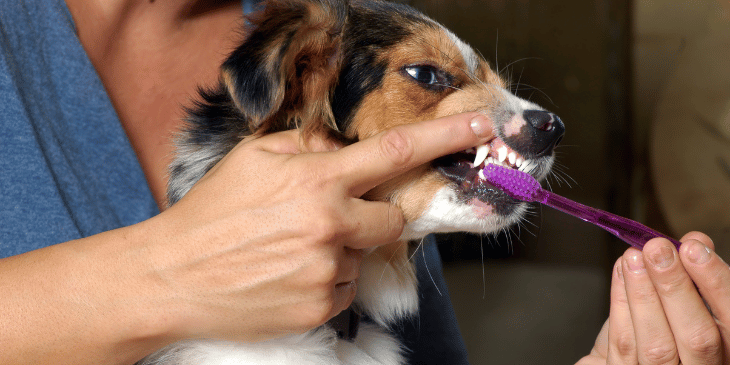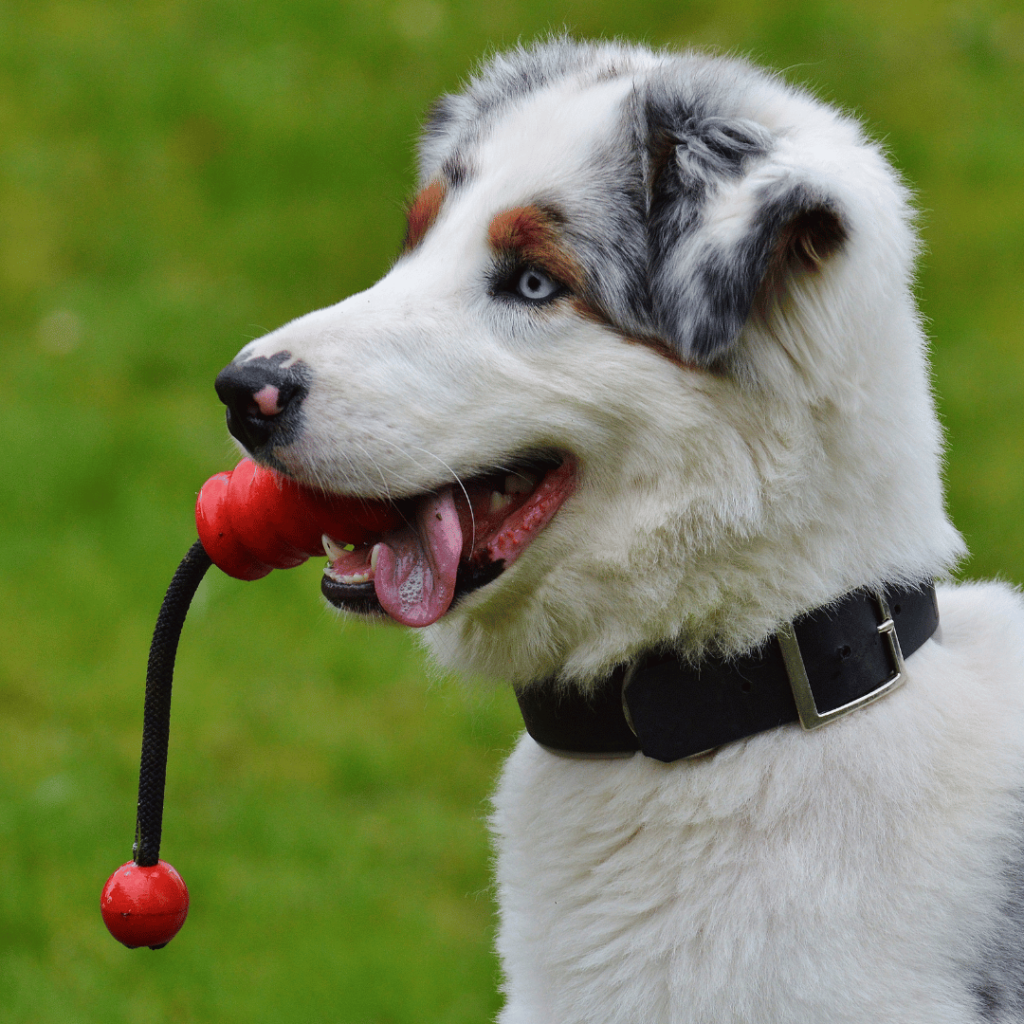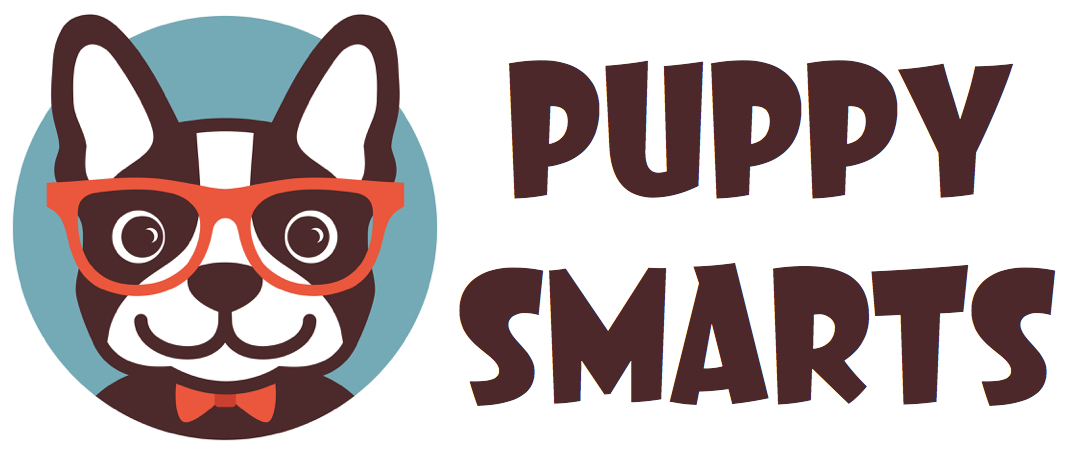How to Clean Your Dog’s Teeth Naturally & Keep Them Healthy

Contents
Have you noticed that your dog’s teeth are beginning to look a little yellow and his breath isn’t exactly smelling fresh? If you want to make sure he doesn’t develop dental issues later in life, now is the time to make some changes!
As with most things, it’s much easier to maintain healthy dog teeth than it is to fix damaged and decayed teeth after a certain point. That said, you may be able to reverse minor discoloration and tartar buildup to some extent at home with proper care.
Read on to learn how to clean your dog’s teeth naturally, keep them healthy, and know when it’s time to reach out to your vet for help
Why You Should Prioritize Your Dog’s Dental Health
Taking care of your dog’s dental health is essential for preventing dental pain and preventing dental problems like mouth sores, ulcers, abscesses, infections, cavities, gum disease, and tooth decay.
Dental disease can have devastating consequences for your dog, including tooth loss, jaw bone deterioration, and severe pain. Unfortunately, dental disease can also lead to heart, liver, and kidney problems, and even diabetes.
How to Clean Your Dog’s Teeth Naturally & Keep Them Healthy at Home
There are many ways to clean your dog’s teeth naturally at home, from brushing to choosing the right food and treats. Here’s what you need to know.
Brushing Your Dog’s Teeth at Home
Brushing your dog’s teeth at home starts with investing in the right supplies. Choosing a dog-specific toothbrush and toothpaste like Petsmile will ensure that the experience is a positive one for you and your fur baby.
A toothbrush made for dogs will be designed to reach all the way to the back of their mouth and in between the teeth. A dog toothbrush will generally come with a large side and a small side to help you get those hard-to-reach areas.
It’s important to know that human toothpaste often contains ingredients that are toxic to dogs. Always choose a dog toothpaste that’s formulated to remove plaque. Bonus points if it freshens breath and comes in a flavor your dog will enjoy!
Here are our top tips for brushing your dog’s teeth at home:
- If your dog simply won’t tolerate a toothbrush, choose a pet toothpaste that doesn’t require brushing. Petsmile Toothpaste is formulated with a natural mineral substance called calprox, which dissolves tartar and cleans the teeth without brushing.
- To get your dog used to the idea of having his teeth brushed, start by wrapping some gauze around your finger and using that to clean his teeth instead. Rub gently in circular motions and keep sessions short until he gets used to the way it feels.
- Brushing the teeth in circular motions will help to remove plaque more efficiently.
- Watch for signs of tenderness, bleeding, or broken teeth. If you notice an issue, hold off on brushing your dog’s teeth and talk to your vet. This should be a positive experience for your dog, and of course, you want to avoid causing him unnecessary pain.
- Brushing your dog’s teeth every day is ideal, but if that’s more than you can manage, aim for at least twice per week.
Use Dog Dental Spray or Water Additive
Dog dental sprays and water additives are great solutions for cleaning the teeth naturally without brushing, as well as taking care of your dog’s teeth in between brushings.
A quick spritz in the mouth or a few drops in the water bowl will kill bacteria and leave your pup’s breath smelling fresh. It will also help to prevent plaque and tartar buildup with minimal effort. Look for a product that’s made from natural ingredients like enzymes and plant oils.
Choose the Right Dog Food
Choosing the right dog food is essential for keeping your dog’s teeth clean and healthy. Choosing high-quality dog food that’s free of cereal grains, meals, and by-products will help ensure that the food doesn’t stick to your dog’s teeth and lead to bacteria buildup.
Look for dog food that is made from whole foods, mainly meat. This will nourish your pet’s overall health, including his teeth.
Offer Raw Bones with Caution
Raw bones are fantastic for scraping and cleaning the teeth naturally, as long as you’re cautious about which bones you offer. The best bone to give your dog is one that’s uncooked and large enough to prevent your pup from swallowing it whole.
Always supervise your dog when he’s chewing on a bone to ensure that he doesn’t break off pieces of the bone and swallow them, which could lead to serious health concerns. It’s also best to check with your vet before offering bones, just in case he recommends against it.
Serve Fruits and Veggies as Snacks
No doubt your dog loves snacks and you enjoy giving them, but many store-bought dog treats are horrible for your dog’s dental health. In fact, most contain cereal grains, hydrogenated fats, and sugar, so they’re not great for your dog’s health in general.
Dog-safe fruits and veggies, in moderation, of course, won’t stick to your dog’s teeth. And, although they can’t remove established plaque, crunching on a few carrot sticks can help to remove food that is stuck to the teeth and prevent the accumulation of plaque.
Give Your Dog Chew Toys

Hard rubber, nylon, and rope chew toys are very good for scraping and cleaning your dog’s teeth naturally at home. Be sure to choose a toy that’s appropriate for your dog’s size and jaw strength.
Hard rubber, nylon, and rope chew toys are very good for scraping and cleaning your dog’s teeth. If you can get your dog to chew on one for a little while after each meal, it can make a huge difference in his dental health. Be sure to choose a toy that’s appropriate for your dog’s size and jaw strength.
Avoid Treats and Chews Made from Starches
Unfortunately, many dental treats and dog chews marketed as being good for your dog’s teeth are made from starches like rice, corn, or potato flour. These starches are much more likely to stick to the teeth than the chews and treats we’ve recommended above.
Some dental chews are also very high in carbohydrates and sugars, making them a poor choice for your dog’s overall health as well.
Of course, not all dental chews are counterproductive. Crunchy chews made from tooth-friendly ingredients like dried meats, coconut oil, pumpkin seeds, cinnamon, grapefruit seed extract, and natural teeth-cleaning enzymes are a great option.
When to Have Your Dog’s Teeth Cleaned Professionally
Always have your dog’s teeth checked by the vet when he goes in for his annual exam. If your vet determines that there’s excessive plaque and tartar on the teeth, or some of the teeth are beginning to decay, a professional dental cleaning will likely be recommended.
Dental cleanings by the vet are typically done under anesthesia. Some vets will only recommend a professional cleaning when a pet has an issue that can’t be resolved by other means. Other vets offer routine cleanings as a part of a preventative healthcare plan.
Taking care of your dog’s teeth at home is a great way to save money on vet bills, but most dogs will still need a professional cleaning every 1-2 years. You should discuss your options carefully with the vet and feel free to ask lots of questions. Don’t hesitate to get a second opinion if you’re unsure about the best decision for you and your fur baby.
When Should Your Dog See the Vet for Dental Issues?
Sometimes, no matter how much effort you put into keeping your dog’s teeth healthy at home, dental issues can still occur. Often, the first sign of an issue is a very strong odor coming from your dog’s mouth.
If your dog will allow it, inspect the teeth and gums carefully. The gums should be a healthy shade of pink and the teeth should be white, with no signs of broken teeth, loose teeth, tartar buildup, cavities, blood, or redness.
A red line at the gumline is a common sign of irritation that can sometimes go overlooked. Excessive drooling, lack of appetite, or difficulty chewing could also indicate that your dog is in pain. If you notice any of these issues, it’s time to call the vet for a dental check-up.
The Takeaway
Dental hygiene is just as important for dogs as it is for humans. Poor dental health can lead to serious health issues, not to mention unnecessary pain and discomfort for your fur baby. Practicing good oral hygiene at home using the strategies above will help to ensure that your dog lives a long, healthy, happy life.
